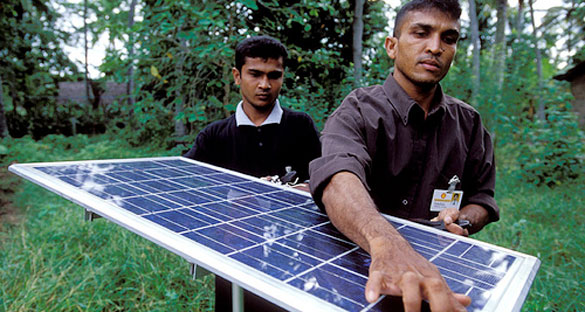Turin, Italy, 6 October 2014 , (ILO)* – More than 120 participants from over 20 countries gather at the ILO International Training Centre for a two-day policy forum and knowledge fair on the green economy.
The event marks the beginning of the first ever “Academy on the Green Economy” – a two-week training and learning event organized within the framework of the Partnership for Action on Green Economy (PAGE). The Forum is meant to strengthen partner links and commitment as well as accelerating action on the green economy.
The Academy (6-17 October) offers a unique opportunity to increase the knowledge and understanding on how to actively promote socially inclusive green economies.

Photo source: ILO
The UNEP Executive Director, Achim Steiner, also addressed participants in a video statement. “It is our hope that with this Green Economy Academy, with the support of the PAGE programme, and with the enormous amount of innovation that is now happening across dozens of countries in the world, we are constructing not only a narrative of a transition towards the green economy, but we are also beginning to create a community of practice,” he said.
“I hope that participants will be champions and key actors in this community of practice of which we in UNEP are both partners and members,” he added.
The transition to a greener economy is becoming a reality in many countries. It implies shifting investments and policies towards clean technologies and energy and resource-efficient infrastructure.
But inclusive green growth also involves environmental protection and social inclusiveness, well-functioning ecosystems, a skilled labour force, strong institutions and good governance.
Achieving this transition will require strong commitment and cooperation at the national level among government agencies, the private sector and the civil society.
Up to 60 Million Additional Jobs
According to ILO research, the transition to a green economy could generate up to 60 million jobs over the next two decades. Recent studies for Europe show that a gain of just one percentage point in energy and material efficiency could generate up to 200,000 additional jobs.
Led by the ILO, the Academy brings together technical knowledge and experience from PAGE partners and other high-level experts on suitable approaches, tested tools and best practices at national and sectoral levels to build long term institutional capacities.
Participants include technical staff from government institutions or ministries, practitioners from the private sector and development agencies, as well as other public and private sector stakeholders. (*Source: ILO Release).
| The PAGE Programme |
|---|
| The Partnership for Action on Green Economy (PAGE) is a seven-year programme launched in response to the appeal made at Rio+20 for the UN system to support countries interested in pursuing the transition to a green economy within the context of sustainable development and poverty eradication. It uses the joint expertise of UN agencies – UNEP, ILO, UNIDO, UNITAR, UNDP and others – to assist a total of 30 countries in their efforts to transition to environmentally viable and socially inclusive economies. PAGE seeks to create enabling conditions in participating countries by: identifying critical bottlenecks, assessing investment options and formulating policies to encourage the creation of a new generation of assets such as clean technologies, resource-efficient infrastructure, well-functioning ecosystems, green skilled labour, job-rich growth, and good governance. |
2014 Human Wrongs Watch






